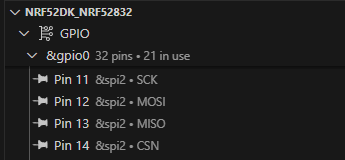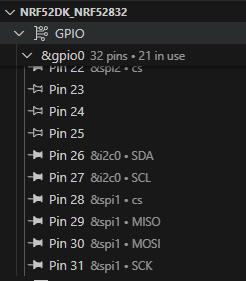Hi,
I test async SPI example with NCS v2.3.0 and nRF52-DK.
https://github.com/too1/ncs-spi-master-slave-example
the nrf52dk_nrf52832.overlay show 4 problems.

&pinctrl {
spi_master_default: spi_master_default {
group1 {
psels = <NRF_PSEL(SPIM_SCK, 0, 31)>,
<NRF_PSEL(SPIM_MOSI, 0, 30)>,
<NRF_PSEL(SPIM_MISO, 0, 29)>;
};
};
spi_master_sleep: spi_master_sleep {
group1 {
psels = <NRF_PSEL(SPIM_SCK, 0, 31)>,
<NRF_PSEL(SPIM_MOSI, 0, 30)>,
<NRF_PSEL(SPIM_MISO, 0, 29)>;
low-power-enable;
};
};
spi_slave_default: spi_slave_default {
group1 {
psels = <NRF_PSEL(SPIS_SCK, 0, 11)>,
<NRF_PSEL(SPIS_MOSI, 0, 12)>,
<NRF_PSEL(SPIS_MISO, 0, 13)>,
<NRF_PSEL(SPIS_CSN, 0, 14)>;
};
};
spi_slave_sleep: spi_slave_sleep {
group1 {
psels = <NRF_PSEL(SPIS_SCK, 0, 11)>,
<NRF_PSEL(SPIS_MOSI, 0, 12)>,
<NRF_PSEL(SPIS_MISO, 0, 13)>,
<NRF_PSEL(SPIS_CSN, 0, 14)>;
low-power-enable;
};
};
};
my_spi_master: &spi1 {
compatible = "nordic,nrf-spi";
status = "okay";
pinctrl-0 = <&spi_master_default>;
pinctrl-1 = <&spi_master_sleep>;
pinctrl-names = "default", "sleep";
cs-gpios = <&gpio0 28 GPIO_ACTIVE_LOW>;
reg_my_spi_master: spi-dev-a@0 {
reg = <0>;
};
};
my_spi_slave: &spi2 {
compatible = "nordic,nrf-spis";
status = "okay";
pinctrl-0 = <&spi_slave_default>;
pinctrl-1 = <&spi_slave_sleep>;
pinctrl-names = "default", "sleep";
def-char = <0x00>;
};
I test the pins with showPins() function taken from this ticket,
Control E-Paper display with SPI.
the pins map is as the following,
P0.00 Map: RTC-OSC-IN
P0.01 Map: RTC-OSC-OUT
P0.02 Map: -
P0.03 Map: -
P0.04 Map: -
P0.05 Map: UartE0 RTS
P0.06 Map: UartE0 Tx
P0.07 Map: UartE0 CTS
P0.08 Map: UartE0 Rx
P0.09 Map: -
P0.10 Map: -
P0.11 Map: SPI2 SCK
P0.12 Map: SPI2 MISO
P0.13 Map: SPI2 MOSI
P0.14 Map: -
P0.15 Map: -
P0.16 Map: -
P0.17 Map: -
P0.18 Map: -
P0.19 Map: -
P0.20 Map: -
P0.21 Map: nRESET
P0.22 Map: NFC 1
P0.23 Map: NFC 2
P0.24 Map: -
P0.25 Map: -
P0.26 Map: -
P0.27 Map: -
P0.28 Map: -
P0.29 Map: SPI1 MISO
P0.30 Map: SP-TWI1 SDA
P0.31 Map: SP-TWI1 SCL
It is not correct in the P0.30, P0.31 and P0.12, P0.13 are swapped.
Does the overlay file problems need to fix, or the overlay file problems can be ignored?






